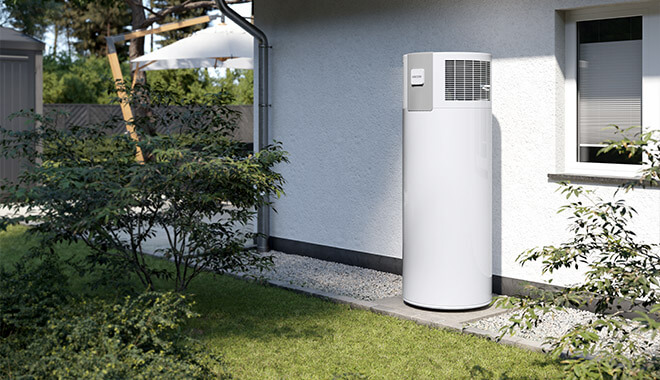Heat pumps are used by the majority of homeowners to heat and cool their houses. However, a heat pump hot water can also be used to heat water, either as a standalone system or as part of a combined water heating and air conditioning system.

How They Operate
Instead of generating heat directly, heat pump hot water heaters use energy to transport heat from one location to another. As a result, they can save two to three times as much energy as traditional electric resistance water heaters. Heat pumps act like a refrigerator in reverse to transport heat.
A stand-alone air-source heat pump hot water heater draws heat from the surrounding air and transfers it — at a higher temperature — to heat water in a storage tank, similar to how a refrigerator pulls heat from inside a box and delivers it into the surrounding room. A stand-alone heat pump water heating system with a built-in water storage tank and backup resistance heating elements is available as an integrated unit. A heat pump can also be retrofitted to work with an existing traditional storage water heater.
Heat pump hot water heaters must be installed at temperatures ranging from 40°F to 90°F (4.4°C to 32.2°C) all year and must have at least 1,000 cubic feet (28.3 cubic meters) of air space around them. The air that passes through the evaporator can be vented either into the room or outside.
Heat pump hot water heaters are inefficient in cold environments because they cool the space they are in. Installing them in an area with a lot of heat, such as a furnace room, will help them work more efficiently.
An air-source heat pump system that combines heating, cooling, and water heating can also be installed. In the winter, these combination systems pull heat from the outside air, while in the summer, they pull heat from the inside air. In a hot region, any sort of air-source heat pump system works more efficiently since it removes heat from the air.
How To Choose A Heat Pump Heater For Water
The starting prices of heat pump hot water heaters are often higher than those of traditional storage water heaters. They do, however, have reduced running costs, which can compensate for the greater purchase and installation costs.
You should also think about the following things before purchasing a heat pump hot water heating system:
- Dimensions and first-hour evaluation
- Type of fuel and its availability
- Efficiencies in energy (energy factor)
- Total expenses
Also Read: 6 Helpful Tips When Buying A Wood Heater
Maintenance And Installation
Your heat pump hot water heating system’s energy efficiency can be improved with proper installation and maintenance.
Many factors influence proper installation. Fuel type, environment, local construction code requirements, and safety concerns are among these considerations. As a result, it’s recommended to have your heat pump installed by a licensed plumbing and heating contractor (or a geothermal heat pump system installer/designer).
When looking for a qualified specialist, keep the following in mind:
- In writing, request cost estimates.
- Inquire about recommendations.
- Consult your local Better Business Bureau for information on the company.
- Check to see if the company will seek a local permit if one is required and if they are familiar with local building codes.
Also Read: Migrating to a cold region? Here are your tips to stay warm!
Periodic water heater maintenance can considerably extend the life of your water heater and reduce efficiency loss. Specific maintenance advice can be found in your owner’s manual.